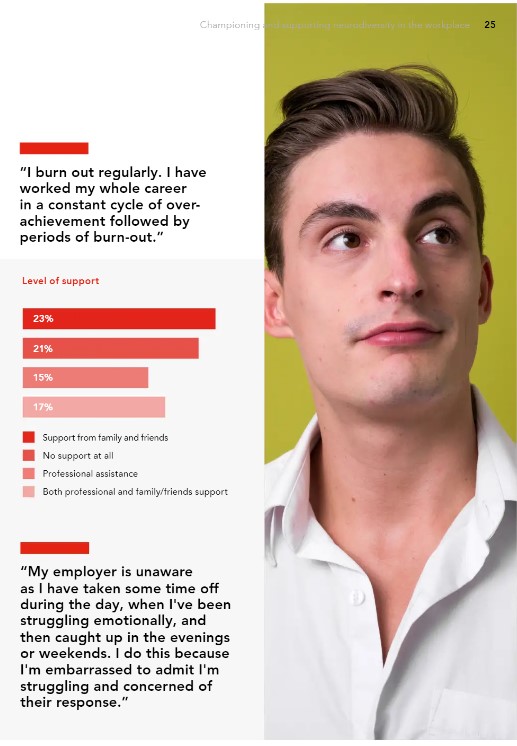- Topics
- Campaigning
- Careers
- Colleges
- Community
- Education and training
- Environment
- Equality
- Federation
- General secretary message
- Government
- Health and safety
- History
- Industrial
- International
- Law
- Members at work
- Nautilus news
- Nautilus partnerships
- Netherlands
- Open days
- Opinion
- Organising
- Podcasts from Nautilus
- Sponsored content
- Switzerland
- Technology
- Ukraine
- United Kingdom
- Welfare

Many companies are starting to realise that the best person for the job may be someone who thinks a little differently because they are neurodiverse – a description which includes people with autism and ADHD.
But thinking differently may also mean that a neurodiverse person needs some adjustments to their workplace in order to work to their best ability.
This year's Neurodiversity Index Report by the UK-based City & Guilds Foundation finds that, while awareness of neurodivergent workers' requirements is increasing, many UK employers could go further in taking neurodiversity seriously and providing adequate workplace support.
NeurodiversAtSea.org, an organisation which champions neurodivergence within the maritime industry, has issued some advice building on the City & Guilds findings and adapting them for maritime.
Priorities for your employer
Two main things should be implemented onboard before anything else, says NeurodiversAtSea.org. These are:
- education – both to inform crew and remove stigma surrounding neurodivergent conditions, and to help foster a supportive environment
- support system – going beyond 'reasonable adjustments' or assessment, this should also offer senior officers access to advice and support on how best to support their neurodivergent colleagues
Line managers need to take responsibility for organising adjustments rather than leaving the employee to find their own solutions, and neurodiverse employees should not have to mask their identity. It also helps if leaders in the organisation are honest about their own neurodivergence, which they may have hidden in the past due to stigma.

How does your company compare?
The City & Guilds report gathered statistics on UK company policies relating to neurodiversity. Nautilus members can compare these key findings with what happens at their own employer.
44% of organisations have neurodiversity strategies, up from 34% in 2022
48% said neurodiversity was important
42% have a neuroinclusion commitment
37% collect data relating to neurodiversity
28% have peer mentoring
43% have neurodiversity champions
21% have no processes to aid neurodivergent employees
Image: City & Guilds

40 tips for students
Study support platform Studocu has come up with over 40 practical tips on creating an effective study plan for neurodiverse students.
Image: Pixabay
Find out moreTags
